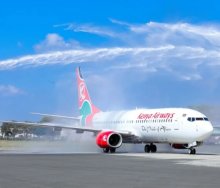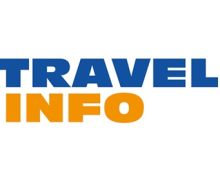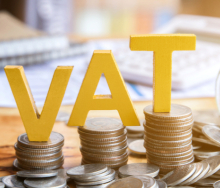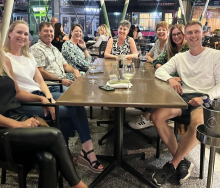Blockchain – should you care?
FROM instant payment
processing to queueless
airports, the
potential of blockchain
technology to eliminate
some of the biggest pain
points in travel has been
loudly touted across the
globe. But is the hype to
be believed and, if so, how
soon can agents expect
this technology to change
the way they do business?
Explaining the way
blockchain works, Sara
Pavan, head of Amadeus
Innovation Partnership
Programme, says it is a
technology that enables
a new way of conducting
digital transactions safely
and transparently, without
the need for a third-party
intermediary.
Other important
features of blockchain
include the fact that
information can only be
added to the network
but never removed. Also,
information is controlled,
authenticated and validated
by participants in the
network rather than one
central administrator.
“It uses cryptography
to secure transactions,
which is a very important
element because it means
information remains
encrypted and kept
private,” says Sara.
Why travel?
“I believe the travel
industry is a good field
of opportunity because
it’s an ecosystem with
multiple players that are
interacting with each other
across different points of
the journey. Each of those
players, at a certain point,
is exchanging and storing
information and validating
information with other
players. This creates a
complex system of backend
processes – this can
be significantly improved
with blockchain and we
have identified this line of
innovation as a priority for
future activities,” she says.
Sara uses a hotel booking
as an example, where an
aggregator, online travel
agency and hotel all
need to settle cash and
commissions based on
pre-defined agreements.
“Today this is an extremely
complex process and
the introduction of
‘smart contracts’ – using
blockchain technology to
exchange items of value in
a transparent way – could
automate settlements
in many areas of the
industry,” she adds.
Some of the potential
applications of blockchain
in the travel industry
include the guarantee and
distribution of contracts,
payments, travellers’
identity and ticketing,
says Claudette Thorne,
country manager: South
Africa at Travelport.
“Each application
requires investment and
collaboration across
partner organisations for
it to be successful. In an
industry that is already
built on trust, where
strong relationships exist
and that is working to
manage complexities – we
have started by asking
the important question:
‘Is there a role for
blockchain?’”
In the pipeline
She says, to answer
this question, Travelport
launched a technology
innovation study into
blockchain and distributed
ledger in mid-2017, and
defined two proofs of
concept that have focused
on managing on-boarding
(uploading of traveller data)
and the management of
travel content for secure
distribution and selling.
“The next stage will be to
develop a proof of concept
further with selected travel
and technology partners,”
says Claudette.
Travelport has also been
considering other potential
use cases for blockchain,
covering different aspects
of travel, from holding
inventory and guaranteeing
a reservation to making
payments.
“The real impact of
blockchain and distributed
ledger technologies
will be a reduction in
processing times and
efficiency improvements
for any process where
multiple parties must
share and agree the
same information,” says
Claudette. Examples
include invoicing,
settlement, moving
of payments, contract
negotiation and identity
verification.
“Travelport customers
currently undertake
many of these activities
using manual processes
with multiple checks
and verification steps. A
distributed ledger secured
by blockchain would ensure
that all parties agree on
a single version of the
truth in real time, cutting
out many of the existing
processes,” she adds.
Amadeus says it has
identified blockchain as
one of its six ‘innovation
themes’ and is currently
assessing its potential
in various practical ways.
Sara says Amadeus’s
blockchain efforts are
focused on seamless
traveller identification
across borders, delivering
interoperability of
loyalty programmes,
enhancements to its
existing B2B wallet
service to facilitate
international payments,
more secure and efficient
bag tracking services, and
a neutral proration (money
distribution) solution for
airlines.
“We have live blockchain
prototypes today in areas
such as baggage tracking,”
says Sara, who adds
that Amadeus is working
with IT companies such
as Accenture, along with
several new blockchain
start-ups, to devise
concepts and new pilot
opportunities.
A long-term approach
Sara says despite being
at a very early stage of
development, blockchain
is gaining significant
traction with an estimated
US$1,2bn (R16,2bn)
invested in application over
the last two years.
While these developments
may all sound exciting,
agents shouldn’t hold their
breath for implementation,
as many of these are still
being tested and are a long
way off from roll-out. “Most
businesses outside the
fintech industry are still at
an exploratory stage and
are watching what others
are doing to see who will
make the first move,”
says Sara, who believes
it will be five years before
agents see blockchain at a
mainstream level.
There are also a
number of barriers still
hindering growth. Sara
says these include
regulatory obstacles, along
with issues around the
scalability of the technology
and its ability to keep up
as volume increases, as
well as the cost involved of
adopting new applications
and synching them with
existing systems.
“We are undergoing a
lot of exploration and we
are using our expertise of
travel to apply blockchain
where it really makes
sense,” says Claudette,
adding that Travelport is
taking a dual approach
of developing prototypes
internally, while also
collaborating with thirdparty
tech start-ups. She
says it will take some time
before the first-use cases
go live – also because
it will be a process to
change mindsets and drive
adoption by proving the
value for both companies
and final users.
Claudette adds that,
in the short term, most
blockchain developments
will happen in close
supplier groups on private
and permissioned chains
within the travel industry.
“In the mid to long term,
we may see payments,
inventory and order
management disrupted by
blockchain or distributed
ledger technologies,” she
says.
“Whole trip management
on blockchain, air
settlement and combining
of air supplier journeys
we see as a longer-term
opportunity, anticipating
further evolution within
blockchain technology.”
She says the willingness of
travel suppliers to offer or
sell content on blockchain
will drive advancements in
these areas.
Some applications of blockchain in travel
Sara Pavan of Amadeus
says there is a wide
range of potentially
important applications of
blockchain technology for
the travel industry.
Today, travellers are
often members of
various loyalty schemes
with disparate points.
Using blockchain, they
could store all their
loyalty points in a
single digital wallet and
redeem them easily,
whilst also sending
and sharing points with
friends via an app.
“Blockchain means
points can be much
more universal, as cash
is today,” she says.
The highly trustworthy,
immutable nature of
blockchain also makes
it ideal for improving
the way travellers are
identified during their
journey.
Traveller IDs are
required at booking,
when changing a
booking, at security, the
boarding gate, duty-free
shopping and the hotel.
“Imagine how much
easier travel would be if
you didn’t need to use
a passport at all these
points in the journey. It
is possible blockchain
could deliver a much
more frictionless
experience for proving a
traveller’s identity,” says
Sara.
Baggage tracking
is another complex
challenge involving
multiple decentralised
actors (airlines, ground
handlers and airports).
“Consider how much
reassurance you’d
have as a traveller
with a single view of
where your bag is,
perhaps available via a
mobile app. A shared
blockchain-based
system may improve
the accuracy and
efficiency of tracking
and managing bags
across the industry,”
adds Sara.
Blockchain timelines
Travelport has estimated how
long it will be before agents
can expect to wait until
various travel applications
based on blockchain
technology will be launched.
How to transform your travel management business
TRAVELPORT has released an
eBook offering insights on how
TMCs can make their approach
and consultancy expertise invaluable
for customers.
Over the past two decades
digital transformation has disrupted
the operating models of many
established businesses. The world is
changing, and customers want to
buy and engage in different ways.
The Global Business Travel Association
forecasts that total spend on business
travel is set to grow by 6,1% to
7% over the next three years. The
challenge for TMCs is knowing how
to implement digital transformation
in a cost-effective way, while still
recognising that their people and
their knowledge are often what sets
them apart from digital competitors.
Today, over 40% of business
travellers are engaging with the
same content on more than one
device simultaneously. 82% engage
with content via their smartphones,
63% on their laptops and 28% via
their tablets. And the smartphone
market still has significant potential for
growth, particularly in Africa and the
Middle East.
This opens a world of new
opportunities for TMCs to transform
customer services and enhance
loyalty through new ways of
engaging with travellers.
Corporate clients want to
experience the same sleek, endto-end
experience that they do
when booking their vacations. They
also need to be able to access this
interface from anywhere, as clients
now work and book while they travel.
According to the Adobe Consumer
Content Survey, millennials spend an
average of 9,6 hours on their devices
per day, while Generation X spend
7,9 hours and baby boomers 6,1 hours
per day. TMCs need to embrace
digital omni-channel technologies,
reinventing themselves to exploit new
sources of value.
Travelport’s global business traveller
research reveals that more than
55% of travellers use voice-activated
search to find relevant information.
New tools such as message and
voice-based interfaces and
automation can enhance flexibility,
provide duty of care and reduce
travel costs. TMCs must connect with
travellers, not only at point of booking
but before booking, throughout their
journey and after they return.
Business travel today is about
offering choice. Many clients are
now looking for authentic local
experiences. Sharing economy
resources can fulfil this demand. While
these products have not traditionally
been available on the GDS, TMCs are
now regularly booking them.
Content choices are also
expanding because suppliers are
disaggregating their offering. New
initiatives, such as the incorporation
of IATA’s new distribution capability
(NDC) into the booking process
means that more optional extras
may be available at the time of
booking. Content is becoming richer
and corporates are looking for tools
that can meet the demand for more
information and data.
Content aggregators offer a simple
supplier comparison experience.
This, however, is so simple that it
cannot provide the data corporates
require. Also, if corporates are not
using approved booking channels,
the risk of data leakage is high and
it is difficult to manage travel policy
compliance. The opportunity to
add value and enhance loyalty
is lost. TMCs can now offer NDCcompliant
airlines’ own rich data if
they engage with an NDC-enabled
technology partner. There is also a
growing demand for apps that can
help travellers who need to make
itinerary changes. Travelport’s global
digital traveller research found that
52% of travellers want concierge
services on their smartphones. These
are particularly valuable in supporting
business travellers likely to be in
potentially risky locations.
Yet, not every traveller wants little
or no interaction with a real person.
Digital technologies can help here
too, supporting the consultant to
offer great service to customers
in the face-to-face or telephonic
environments. TMCs must adapt how
they engage with customers to meet
their evolving needs. Platforms such
as instant messaging can provide a
fast and convenient communication
channel. TMCs can now also make
use of the exponential increase of
data available to devise specific
personalised recommendations for
each client in the form of consultancy
services. Such actionable intelligence
allows TMCs to add value and
therefore develop customer loyalty.
Digital transformation is also
powering more multinational and
global travel programmes. While a
multimillion-dollar account needs
data to negotiate its own deals,
smaller accounts might want to take
advantage of a TMC negotiating
on its behalf. In the future, TMCs are
likely to be viewed as an integral part
of the business travel supply chain
rather than merely as intermediary
distributors.
Delicate balance between high tech and high touch
ONE of the main advantages
agents have over the Internet
is the ability to provide the
human touch – a friendly
voice on the other end of
the phone, talking travellers
through any problems or
changes that may crop up
during travel. But what if this
isn’t what travellers really
want?
According to the 2017
Egencia Business Travel and
Technology Survey, exactly half
(50%) of global respondents
(business travellers) would
avoid human interaction on the
road unless they were having a
problem, and more than
half (56%) said they wanted
access to business travel
tools to do more on mobile in
general.
Other findings in the
Egencia survey include that
48% of respondents would
like to use text to update
their travel arrangements,
while 43% believe advances
in artificial intelligence (AI)
would help improve their travel
experiences.
A local perspective
But, warns, Mladen Lukic,
gm of Travel Counsellors SA,
agents should view these
results with caution. “As with
any survey, the outcome will
be largely dependent on the
choice of audience and the
formulation of the questions.
It’s not surprising that a
survey by an OTA finds that
customers do not wish to talk
to humans.
“We absolutely believe in
the opposite. Our clients
don’t want their time wasted
and they want prompt,
independent, accurate and
qualified, trusted information
from our Travel Counsellors.
If a client doesn’t trust the
source, then clearly they will
reject talking to it.”
Others felt that we’re just
starting to see the beginning
of a similar trend locally,
including Aadil Esack: gm of
product and marketing for XL
Travel. He says: “Many travel
processes can be automated
and made more efficient, so
it’s a case of knowing your
client and looking at where you
can truly add value based on
experience and where you can
use technology instead. As
a TMC, you should give your
client the option.”
When considering local
travellers, Annemarie Lexow,
sales and marketing manager
of Travel Vision, says she
has noted that millennials
and mobile-savvy travellers
on holiday find it easy to find
things to do through apps
and Google searches – but
only once they arrive at
their destination. “Business
travellers are different. They
prefer to stay in touch should
anything go wrong with travel
arrangements.”
A balancing act
So, where does this leave
the corporate travel agent?
Jannine Adams, senior
manager: marketing at
Amadeus Southern Africa, says
consultants need to realise
that local travellers expect
their journey to be a seamless
travel experience with travelsavvy
business travellers
demanding a more ‘connected’
experience. “Travellers want
a multi-channel approach
with access to real-time
information.”
But this doesn’t mean that
the agent doesn’t have a
crucial role to play. “At the
same time, business travellers
still take great comfort that
they can phone the TMC
and sort things out when
technology fails them,” says
Jannine.
Getting the balance right
between high-tech and hightouch
can be a delicate act,
and Jannine emphasises that
a “one-size-fits-all approach” is
a thing of the past.
“Today, travellers demand
customisation. They want
products and services that
respond to their needs and
preferences. An important
facet of today’s travel
experience is how well
travellers feel their needs
and preferences are being
understood by travel providers.
This includes striking the right
balance between respecting
their desire for independence
and lack of intrusive service,
which may shift at different
points along the trip cycle.
Enhancing their trip by
checking in to offer additional
elements or assistance might
be appreciated,” says Jannine.
Mladen also adds that the
balance between contact and
technology will be different for
each client and the agents’
business model. “In our world,
it is not the transaction, but
the overall outcome that
defines our relationship.
As long as we are prompt,
accurate and trusted, clients
will expect and accept all
communication,” he says.
Demand for 24/7 digital support and human advice
A recent survey by Travelport
has shown that millennial
business travellers in
South Africa demand both
cutting-edge digital support
throughout their trips and
on-demand advice from
human consultants.
The research surveyed
11 000 travellers in 19
countries who took at least
one return flight in the last
year, including 500 travellers
from South Africa. Findings
included:
One-third (37%) of South
African millennial business
travellers now count being
unable to access booking
information across their
devices 24/7 as one of
their biggest gripes.
Two-fifths (39%) say not
being able to get expert
advice from human
consultants during the
booking process is a major
annoyance.
Other findings of the survey
included that most of South
Africa’s millennial business
travellers are now doing
their own research before
finalising their travel plans.
Among the most common
tools used to build their
itinerary are general advice
sites (used by 89%) and
review sites (87%). Looking
through videos and photos
posted by travel brands on
social media (81%) is also
typical, as is using voicesearch
technology (54%).
While on business trips,
South African millennial
business travellers on
average use 18 different
categories of apps. Of these,
map apps are among the
most popular (used by 92%),
along with those that provide
video tools (91%). High
results were also recorded
for social media (90%), travel
review (81%) and destination
guide (77%) apps.
The limitations of chatbots
WITH improvements
constantly being made in
artificial intelligence (AI)
technology, chatbots are
starting to play a more
complex role in the travel
industry, with various
businesses investigating the
opportunities they present.
While not launched locally
just yet, FCM’s chatbot,
Sam, has been introduced
internationally and has the
ability to send through pretrip
information such as
weather updates, organise
airport transfers and
provide up-to-date airport
information. But despite
being able to automatically
sync travel plans and
rearrange travel within
a corporate’s policy, the
bot also offers live chat
with travel consultants –
illustrating that in some
instances, only chatting with
a real person will do.
Illustrating this point,
research indicates that users
are reporting frustrating
experiences when interacting
with chatbots.
Last year, Facebook
announced that it would
be integrating chatbots
into its Messenger app to
answer users’ questions,
but found that its bots failed
to complete 70% of user
requests without the
help of a human.
Despite this, various travel
businesses are still keeping
an eye the chatbot trend.
Rian Bornman, founding
director of the FlightSite
Group, says it’s a space he’s
watching closely.
“We see getting from A to B
becoming truly commoditised
and a hyper-competitive
space where AI will play a
significant role. Travel advice
on travel planning, however,
will remain better served by
consultants for the long term
in our view,” he says.
Some travel companies,
on the other hand, do
not believe that chatbots
have a role to play in
their technology strategy.
Mladen Lukic of Travel
Counsellors, says all
technology development by
Travel Counsellors is always
to enhance the consultants’
ability to more accurately
service and ultimately
achieve a better outcome for
their clients.
“It is never to replace a
Travel Counsellor in the
conversation.
Photocap: App a winner!
Travel Counsellors has seen a 20% increase in
conversion rate on its ‘myTC’ customer app, when
compared with other digital marketing tools. Internal
research has shown that customers are more likely
to book after downloading the company’s app and
receiving the travel quotation on their mobile phone.
Will the OTA bubble burst?
WITH slick, user-friendly
websites and sometimes
impossibly low fares and
hotel rates, online travel
agencies (OTAs) can be
a constant thorn in the
travel consultant’s side
– but could the industry
be headed for a major
shake-up?
Mladen Lukic of Travel
Counsellors says he
believes that ultimately,
there will be just two
business models in travel.
“Companies that are
ultra-effective, but entirely
transactional with focus
on price and convenience,
and companies that excel
in managing outcome and
therefore provide holistic
service focused on
trusted relationships.
“There will be types of
travel that are obviously
more suited to one of
the two models but,
ultimately, clients will
choose, as they do when
they buy other goods and
services. Both will have to
perfect their models and
both will have to invest
heavily in technology.
Anyone left in the middle
covering all bases, will
cease to exist,” he adds.
While headlines would
have you believe that
OTAs are killing bricksand-mortar
agencies,
similarly, traditional
agents may be guilty
of exaggerating and
believing that OTAs are
on borrowed time, says
Aadil Esack of XL Travel.
“I believe OTAs are here
to stay and they are your
modern-day competitor.
Assuming their collapse
is dangerous – it’s far
better to focus on what
you are going to do to
counter the threat they
present.”
While OTAs are unlikely
to disappear from the
industry, Herby Seedat,
chief technical officer
of BidTravel, says he
believes the way that
they operate is likely to
change.
“Perhaps one of the
disruptions is going to be
blockchain and how that
is adopted by product
owners. Having said
that, my view is that it
is probably a long-term
change. I cannot see
product owners being
sufficiently flexible to
move fast enough.
“Therefore, for now,
OTAs will continue to
flourish. What they do
with ancillaries and fare
families is also going to
be an interesting space
to watch, probably linked
to how the NDC space
progresses as well,” adds
Herby.
To the point
An updated version of TIC’s agent portal, SystemaTIC, which is now 15
years old, is to be released. Besides a clean new look, it includes new
features like agent policy management, advanced functions on reporting.
How to use predictive analytics to sell more
ONLINE giants like Amazon
are well known for the way
they use predictive analytics
to drive sales. We’ve all seen
the messages that pop up on
screen, suggesting products
based on previous searches
or purchases. Essentially,
predictive analytics means
profiling users and using
these models to predict future
behaviour – and this could
have a huge impact on the
way agents sell travel as well.
In a recent survey,
Travelport found that twofifths
of respondents (39%)
said they were frustrated
when companies didn’t use
data analytics to provide
highly personalised travel
recommendations based on
their past preferences.
Mladen Lukic of Travel
Counsellors says there is a
huge opportunity for agencies
or consortiums to use similar
technology to companies such
as Amazon. “Understanding
the customer journey is the
foundation on which we
build all our systems. Every
interaction with a client
is enhanced by what we
have learned from previous
interactions,” he says.
“However, the difference
with Travel Counsellors,” says
Mladen, “is that we maintain
long-term relationships that
are then unique for each client
– whereas a transactional
company would look to
segment customers into
groups to suggest products or
services based on a common
profile.” He also emphasises
that predictive analytics don’t
just have a role to play as a
selling tool but can be used
to get to know your client’s
needs and adapt your service
offering in response.
Aadil Esack of XL Travel
agrees that predictive
analytics have a role to play
beyond just earning the TMC
or agency additional revenue.
“We have spent a lot of time
investigating and studying
predictive analytics, and
implementing this technology
is a no-brainer as far as we’re
concerned.” He says, not only
can it result in more income,
but also help your client by
providing them with the best
deal, service and journey
possible.
But rolling out predictive
analytics isn’t necessarily a
simple process, says
Riaan van Schoor, ceo
of Agentivity. “Whilst this
technology is being well used
in the retail space, we don’t
think it’s that straightforward
in travel, especially leisure,
which is typically a varied
buy, and not repetitive.
“Ideally, a traveller goes
to a different destination
for their next holiday. In the
corporate space, travel buying
is more repetitive and, yes, we
can see predictive analytics
playing some role but, again,
the travel patterns are based
on the buyer’s industry,
requirements, projects, and
so on. All variables come into
play,” says Riaan.
Instead, Agentivity believes
predictive analytics could
work better to predict buying
behaviour around elements
like advance purchase, delays
in providing authorisation to
ticket, and so forth. “Analytics
to help the agent predict how
much work a client might
demand from them, and
comparing that to the eventual
income – being smart and
adaptive about how a TMC
works with clients,” he says.
While predictive analytics
may play some role in an
agent earning additional
income through the selling of
ancillaries, Riaan warns that
there needs to be a change
in the current model for this
to work. “We think there
needs to be more movement
in the incentives involved for
an agent to sell ancillaries –
apart from applying service
fees to these – sometimes
with great difficulty. We’re not
aware that airlines are overlyenthusiastic
about paying
agents for selling these – so
what is the incentive? Again,
using predictive analytics to
suggest where the sale of
an ancillary was a success
previously, to ascertain if it’s
worth pitching it on the next
sale, can work,” he adds.
Travel Counsellors launches new dashboard
TRAVEL Counsellors will soon
launch a new online tool to enable
business owners to finely tune their
marketing efforts to appeal to their
customers’ lifestyle. The customer
dashboard has been launched
globally and will be released into
the SA market “very soon”.
The dashboard, which has been
designed and built in-house, will
allow Travel Counsellors to get an
overview of their customer base
and identify opportunities to build
relationships with those clients who
will bring the greatest value to their
businesses, recommending tools
and techniques to market to them.
The technology behind the
dashboard, located in the
company’s customer management
system, segments each Travel
Counsellor’s contact database,
maps their travel interests and logs
their booking behaviours to produce
customer personas that can be
used to target marketing efforts
more effectively.
Travel Counsellors’ digital strategy
and innovation director, Waseem
Haq, explains: “We use customer
data to create a pen portrait or
profile of the customer and put
measurable marketing activity,
such as social media content or
online destination brochures, in
place so that our Travel Counsellor
franchisees have all the digital
tools at their disposal in truly tailormaking
marketing efforts to their
clients’ preferences.
Full visibility
“Each Travel Counsellor will
have full visibility of the types of
customer personas that sit within
their contact centres.
“Ultimately, we are using this
insight and data to give them an
even more informed view of their
customers, which enhances the
experience they create and the
relationships they build. They are in
control of how they keep in touch,
but this is an added-value tool to
give them even more opportunity
to build on the tailor-made service
they deliver,” adds Waseem.
The dashboard’s pool of data
is also enhanced by Travel
Counsellors’ customer preference
centre app, an online device that
records customer preferences.
Amadeus releases Travel Alerts Notifier
AMADEUS has launched a new
product, Amadeus Travel Alerts
Notifier (ATAN), that allows travel
agents to keep their travellers
informed of any changes to their
travel plans throughout the entire
trip cycle.
Amadeus says independent
surveys have shown that more than
80% of passengers would like to
stay informed by airlines and airports
throughout their journey. “The need
for real-time information becomes
more pronounced still
when the traveller
is faced with
disruption during
the trip,” says
Jannine Adams of
Amadeus Southern
Africa.
With ATAN, agents
can stay connected to
their clients and deliver
instant, automated
alerts of changes to the
client’s travel plans from
the initial booking up to
their arrival back home.
ATAN provides several different alerts
without any intervention from the
agents. These notifications are sent
via SMS or email for flight updates
affecting clients’ schedules, waitlist
confirmation, re-seating, cancellation,
amongst other changes. It also
alerts passengers to airport changes
such as boarding gate, baggage
carousel, terminal changes or delays.
“For travellers – disruption is
personal. It’s a missed business
meeting or another night away
from home at the end of a
long business trip. And, it’s
precisely at these times
that the traveller
wants immediate
answers,” she
adds.
Did you know?
Travelport has signed a multi-year agreement with Qantas
that includes distribution of the airline’s content and
integration into Qantas’s new NDC platform. Travelport’s Rich
Content and Merchandising solution has been deployed,
giving agents access to images of cabins and meals and the
ability to book ancillaries such as extra leg-room seating.
Agentivity is in the process of rolling out its next-generation
platform – Agentivity V3. This new platform is driven by
Agentivity’s API and allows for a substantial improvement
in the user experience and flexibility in how customers can
interact with their data. A key enhancement is the merging
of reports to offer a far simpler user experience, and the
ability for the system to show key metrics to different user
types (e.g. management, operations, finance, agent).
Amazon enters the hospitality world
AMAZON has announced
a new offering, Alexa for
Hospitality, which will see the
company’s voice-controlled
Alexa technology brought into
hotel rooms.
Currently Alexa for Hospitality
is only available to providers
by invitation, with Marriott
International introducing
the technology at selected
properties in Marriott Hotels,
Westin Hotels and Resorts,
St Regis Hotels and Resorts,
Aloft Hotels and Autograph
Collection Hotels from the
Northern hemisphere summer.
Guests will be able to use
Amazon Echo in their rooms
to ask Alexa for information
about the hotel, such as the
opening hours of the pool,
or the location of the gym.
Providers will also be able
to configure Alexa so that
guests can control the lights,
thermostats, blinds, and TVs in
their rooms, or even to call the
concierge.
Jennifer Hsieh, vp: Customer
Experience Innovation,
Marriott International, said:
“So many of our guests use
voice technology in their
home, and we want to extend
that convenience to their
travel experience. Guests
of Charlotte Marriott City
Center and Marriott Irvine
Spectrum will be among the
first to experience a curated
list of Alexa for Hospitality
features. We will be evaluating
guest feedback and adoption
to inform how we expand
the skills, features and
functionality offered through
Alexa in our hotels.”
Other Marriott properties
that will see the introduction
of Alexa include: the Cavalier
in Virginia Beach, Playa Largo,
EMC2, Ambassador Tulsa, and
the Ambassador Wichita, from
the Autograph Collection; the
Westin, in Buffalo; St Regis,
Atlanta, and the Aloft DublinPleasanton,
outside San
Francisco.
There are also plans to see
Alexa for Hospitality provide
guests with the option to
connect their Amazon account
to an Alexa-enabled device
in the room, so they can play
their own music from apps
like Amazon Music or Spotify,
or listen to audiobooks from
Audible. At check-out, Alexa for
Hospitality will automatically
disconnect the guest’s Amazon
account from the in-room
device.
Marriott has no immediate
plans to roll out the technology
to hotels beyond the US, but
may do so after gauging guest
responses.













